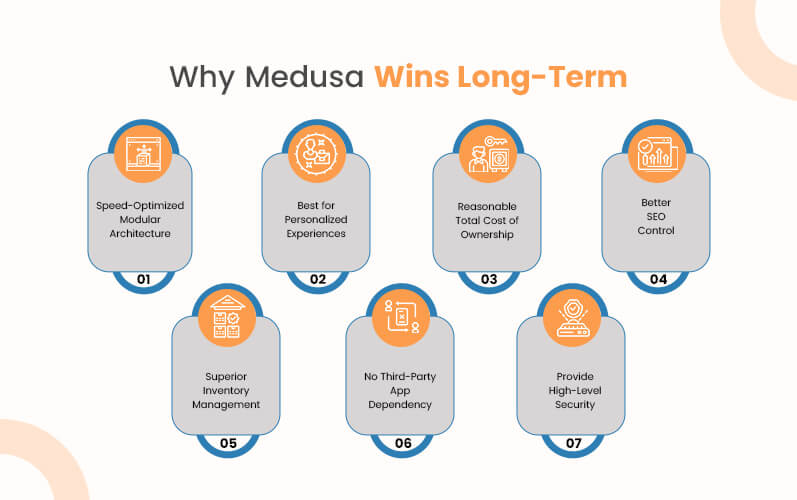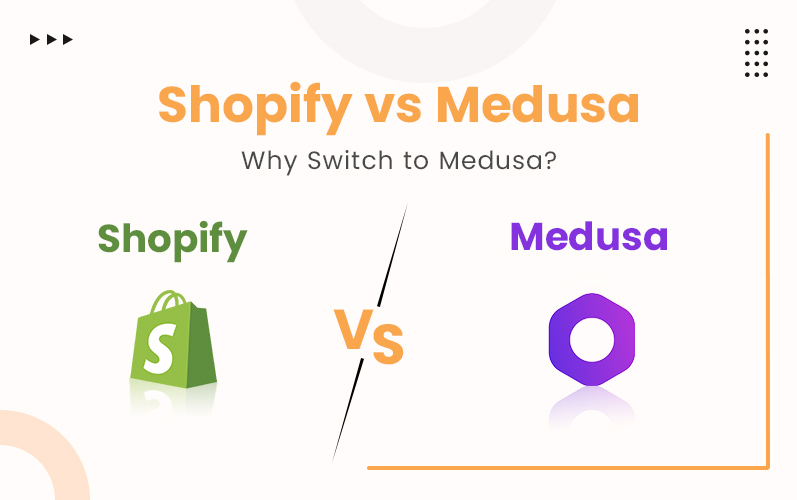This guide explores why businesses are moving from Shopify to Medusa ecommerce, highlighting cost issues, customization limits, scaling challenges, and app dependencies. You’ll discover how Medusa’s open-source, headless architecture offers flexibility, lower ownership costs, better performance, and long-term scalability. Whether you’re a startup or a fast-growing brand, or an enterprise seeking complete ownership of your e-commerce stack, this resource will help you decide if Medusa is the smarter choice for your business future.
Why Businesses Are Rethinking Shopify
Shopify has long been the go-to e-commerce platform for small and mid-sized businesses. It's user-friendly, comes with pre-built templates, and offers a wide range of apps. But over time, many businesses are finding that Shopify’s strengths also come with frustrating trade-offs. Rising subscription fees, costly add-ons, and rigid customization rules leave merchants feeling stuck.
If you're reading this, you're likely searching for something more flexible, scalable, and cost-effective. This is where Medusa, an open-source alternative to Shopify, enters the picture. When comparing Medusa vs. Shopify flexibility, it quickly becomes clear why developers and growing brands are making the switch.
The Common Pain Points with Shopify
Shopify has a wide popularity, and due to this reason, it is broadly used in many businesses. But today it shows several drawbacks that frustrate scaling businesses.
Some of the drawbacks are given below:
Page Speed & Performance Issue: A sluggish Shopify site leads to 11% fewer page views, 16% lower customer satisfaction, and 7% fewer sales. The core infrastructure of Shopify is integrated with heavy themes, excess apps, and unoptimized content that make a slow-loading site. This sluggishness directly hurts the user experience and conversions.
Hidden Shopify Costs: Shopify erodes profits by layering costs, as each app exceeds $200 every month with an additional 0.5 – 2% gateway fee. In addition to this, currency conversion charges are also required for international merchants. As sales grow, expenses scale sharply, surprising merchants with higher total ownership costs.
Shopify App Dependency Issues: Merchants want to boost the features of Shopify Store, and due to this reason, they integrate third-party apps. Though these third-party apps increase flexibility, they also cause several complexities. The fragile integrations can significantly drop the page speed from 95 to 60.
SEO Restrictions: The rigid URL path of Shopify constricts the blogging tools and restricts optimization. The SEO hurdles hinder keyword strategy and keyword-optimized site structure. This uncontrolled mechanism also obstructs content visibility, which causes ambitious brands to lose organic traffic opportunities.
Inventory Management Limits: The native inventory tools of Shopify struggle with complex SKUs, multi-warehouse stock, and B2B/B2C fulfillment. Growing businesses face overselling, delays, and poor customer experience without advanced inventory tracking or product bundling.
Security Threats: Despite level 1 PCI DSS compliance, Shopify stores face a growing cyber threat. Data breaches can cause financial loss, reputational damage, and legal issues. Any other option that comes with high-level security measures like SSL encryption and double-layered authentication can mitigate these issues.
Limited Customization: Businesses are locked into Shopify’s ecosystem, making it difficult to go beyond its pre-set templates and functionalities. This restriction prevents brands from fully tailoring their storefronts, workflows, or unique features, thus limiting creativity.
These limitations push several businesses to seek other open-source eCommerce solutions that are better than Shopify so that they can quickly scale their operations.
Meet Medusa: The Open-Source Alternative
Medusa Ecommerce is a headless, open-source e-commerce platform designed for flexibility and scalability. Unlike Shopify, you’re not tied to subscription tiers or locked into an ecosystem. With Medusa, you control the codebase, meaning you can tailor the platform to your exact needs without relying on dozens of costly plugins.
For developers and growth-focused brands, Medusa provides the freedom to innovate while keeping costs under control.

Why Is Medusa the Better Long-Term Choice?
When evaluating, is Medusa better than Shopify? The answer often comes down to long-term value.
Speed-Optimized Modular Architecture: Medusa.js has a headless architecture that separates the backend logic and admin dashboard from the storefront. This modular design boosts flexibility and significantly improves page speed by 50%. This headless structure also guarantees smooth performance and navigation speed across all devices, which improves customer satisfaction.
Best for Personalized Experiences: The headless model of Medusa.js separates the front end and back end, creating a unique customer journey across channels. Businesses can tailor experiences using preferences, browsing history, and purchase behavior. This feature enables businesses to create richer personalization than Shopify.
Reasonable Total Cost of Ownership: The MIT-licensed core of Medusa avoids platform licenses or GMV taxes. Therefore, you just have to pay the hosting and development charges only. In open-source ecommerce vs. Shopify comparisons, Medusa offers more predictable and reasonable TCO.
Better SEO Control: The headless structure of Medusa lets you own the front end, giving you control over metadata, structured data, and speed. By pairing with other backend frameworks, Medusa helps businesses to get better crawlability and superior search rankings.
Superior Inventory Management: Medusa provides stock locations and an inventory module, which you can extend through codes. This approach supports multi-warehouse policies and complex SKU logic. This flexibility suits B2B/B2C setups and bundles better than fixed, one-size workflows in hosted platforms.
No Third-Party App Dependency: Medusa helps you to extend commerce via open plugins or custom modules, keeping features in your codebase. This inhibits the integration of any further add-ons.
Provide High-Level Security: The open-source code format of Medusa and self-hosting capabilities let teams gain full-stack visibility and enforce stricter controls. It provides better isolation, encryption, and code audit features than Shopify.
Who Should Consider Switching to Medusa?
- For businesses that are tired of paying Shopify’s huge transaction fees, Medusa is a perfect choice.
- Startups that need unique features that are quite unachievable using Shopify templates.
- Growing brands that are struggling with scaling costs and ecosystem lock-in.
- Companies that want complete ownership and customization for their eCommerce platform.
If any of these scenarios sound familiar, Medusa vs. Shopify flexibility becomes an easy decision.
Shopify Vs. Medusa: Side-by-Side Comparison
| Feature | Shopify | Medusa |
|---|---|---|
| Cost | Monthly subscription charges + transaction fees + paid apps increase expenses. | Free core platform; paid hosting and custom Medusa development. |
| Customization | Limited; locked into templates and Shopify’s ecosystem. | Fully customizable; open source gives complete control over features. |
| Scalability | Becomes costly as business grows; limited for complex models. | Built for scalability, the flexible architecture handles advanced needs. |
| Ecosystem | Large app store but high app dependency and added costs. | API-first approach with plugins, integrations, and no forced dependency. |
| Best for | Small to medium sellers with basic requirements and limited tech skills. | Developers, startups, and scaling brands need full ownership. |
Making the Switch: From Shopify to Medusa
Migrating doesn’t have to be overwhelming. Many businesses have successfully moved from Shopify to Medusa with a structured process. The key steps include:
- Begin by exporting all critical information from Shopify. This should include products, customers, and order history. Implementing this technique can ensure nothing is lost during the transition and creates a solid foundation for the Medusa development process.
- Install and configure the Medusa server to manage your store’s core commerce logic. Businesses configure their servers and databases, laying the foundation for a stable e-commerce infrastructure that can scale efficiently as operations expand.
- Integrate your chosen frontend (React, Next.js, or any other framework you prefer.) Here’s where Medusa development shines, giving teams the flexibility to connect modern front-end technologies to the back end. This advantage gives you the upper hand in creating fast, responsive, and customizable storefronts.
- Extend your store with payment gateways, shipping solutions, or analytics tools. Through Medusa Ecommerce, you can build custom plugins or integrations to meet unique requirements without relying on costly third-party apps.
Conclusion: Is Medusa Right for You?
If Shopify feels too expensive, restrictive, or difficult to scale, then Medusa is a smarter choice for your business. By offering open-source flexibility, developer freedom, and cost-efficient scalability, Medusa brings prominence and sustainable growth for your business.
The Tech Clouds has a proficient Medusa development team, who helps businesses plan, execute, and scale this migration smoothly. They specialize in creating tailored, future-proof e-commerce solutions that give businesses complete control over their online stores. Their developers focus on scalability, performance, and security, ensuring that your store not only functions smoothly but also remains ready to grow with tomorrow’s demands.
Ready to break free from Shopify’s limitations? Call our experts today!
Our team connects with you seamlessly and addresses your queries without delay.



